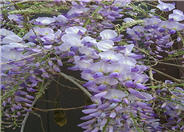
Common name:Wisteria
Botanical name:Wisteria sinensis
While the sinensis is similar to the floribunda, it bears more rounded, full clusters of strongly fragrant flowers which open more or less, all at once. There are usually 13-15 leaflets per leaf, and they require full sun and average to little watering. It comes in many colors in the blues, whites and purples.
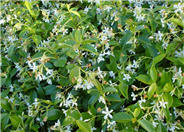
Common name:Star Jasmine
Botanical name:Trachelospermum jasminoides
The Star Jasmine is an evergreen vine that grows 20' tall or as a groundcover that reaches 1'-2' tall and 4'-5' wide. It has white fragrant flowers in the summer and can tolerate sun or partial shade. The Star Jasmine is also drought tolerant.
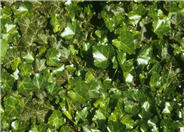
Common name:English Ivy
Botanical name:Hedera helix
This evergreen vine has dark green leaves with pale green veins. When mature, clusters of small green flowers will bloom followed by black berries.
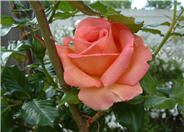
Common name:Hybrid Tea Rose (selections)
Botanical name:Rosa Hybrid Tea varieties
These shrubs and vines are the most loved in the Western USA and are very resilient. They come in a wide variety of sizes and colors and are easy to maintain with proper care. They can be used in a water-conserving garden with careful attention to irrigation practices.
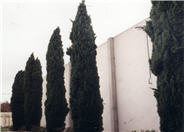
Common name:Italian Cypress
Botanical name:Cupressus sempervirens 'Stricta'
Italian Cypress is often associated with Italian and Spanish architecture, providing columns in the landscape. They often reach 60' tall. 'Stricta' is compact, columnar and produces long, straight branches with deep green foliage.
| Designer: | Arbor on the Parkway |
Photographer: GardenSoft |
Soils and Compost:
Maintain a two to four inch layer of mulch on the soil surface to reduce weeds, infiltrate rain water, and reduce compaction.
Water Saving Tip:
Lawn watering more than 5 minutes usually results in runoff. Use multiple cycle starts.
Integrated Pest Management:
Attract, or buy beneficial insects such as ladybugs and lacewings to control pest outbreaks in your garden.

